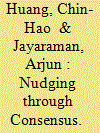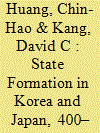|
|
|
Sort Order |
|
|
|
Items / Page
|
|
|
|
|
|
|
| Srl | Item |
| 1 |
ID:
141094


|
|
|
|
|
| Summary/Abstract |
Debates about whether China's rise poses a threat or an opportunity for Taiwan have settled into a realist assumption that Beijing will continue to upset the balance of power and a liberal approach that believes the benefits of economic interdependence are leading to greater gains. Missing from this debate is a nuanced consideration of how Taiwan's policy elites view themselves and their position in cross-Strait relations. Taiwan's decision makers' views are deeply affected by, and interact with, factors and institutions on and beyond the island. This article offers a model of political processes – the staying power of the status quo and order of movement – as a possible route towards an explanation for Taiwan's position on cross-Strait negotiations. The conclusion is that the status quo position – de facto but not de jure independence – is becoming more entrenched with time. Taiwan's colours of partisanship, Blue and Green, are blending into Aquamarine.
|
|
|
|
|
|
|
|
|
|
|
|
|
|
|
|
| 2 |
ID:
181879


|
|
|
|
|
| Summary/Abstract |
With its emphasis on organizational minimalism, how does ASEAN induce change in its members’ policies? This paper examines the impact of consensus within ASEAN on haze mitigation in the Indonesian archipelago. When ASEAN articulates its environmental initiatives with a strong consensus, this clarity in its norms incentivizes emulation. The stronger the consensus within the group, the more compelling it becomes for members to adopt the agreement. Such prosocial behavior reflects nudging. Strong ASEAN consensus is a precursor of nudging that leads to dimmer hotspots. This study draws on discourse analysis of ASEAN summit statements on the haze, R programming to analyze NASA data on the brightness of peatland hotspots, and a case study to illustrate the causal mechanism. The findings identify ASEAN’s role in environmental governance, particularly with respect to when consensus-based nudging is more or less likely to incentivize member states to curb transboundary haze.
|
|
|
|
|
|
|
|
|
|
|
|
|
|
|
|
| 3 |
ID:
108077


|
|
|
|
|
| Publication |
2011.
|
| Summary/Abstract |
China's expanding role in peacekeeping opens up a new avenue for China to strengthen global peace operations and contribute to stability and security in Africa and other developing regions, raising the prospects for China to become even more integrated into the international community. Its evolving role in peacekeeping is underpinned by a combination of factors. Through increasing socialization and interaction with the international community, China has become more willing to accept global norms and to contribute to peace and stability. At the same time, participation in peacekeeping allows China to professionalize its armed forces, to test its power projection capabilities and to pursue its aspirations to become a major global power. Whether such cooperative behaviour will be reversed or sustained is still uncertain. As such, its definitive role in peacekeeping remains largely indeterminate and thus merits continued and more nuanced observation.
|
|
|
|
|
|
|
|
|
|
|
|
|
|
|
|
| 4 |
ID:
183773


|
|
|
|
|
| Summary/Abstract |
State formation occurred in Korea and Japan 1,000 years before it did in Europe, and it occurred for reasons of emulation and learning, not bellicist competition. State formation in historical East Asia occurred under a hegemonic system in which war was relatively rare, not under a balance-of-power system with regular existential threats. Korea and Japan emerged as states between the fifth and ninth centuries CE and existed for centuries thereafter with centralized bureaucratic control defined over territory and administrative capacity to tax their populations, field large militaries, and provide extensive public goods. They created these institutions not to wage war or suppress revolt: the longevity of dynasties in these countries is evidence of both the peacefulness of their region and their internal stability. Rather, Korea and Japan developed state institutions through emulation and learning from China. The elites of both copied Chinese civilization for reasons of prestige and domestic legitimacy in the competition between the court and the nobility.
|
|
|
|
|
|
|
|
|
|
|
|
|
|
|
|
|
|
|
|
|